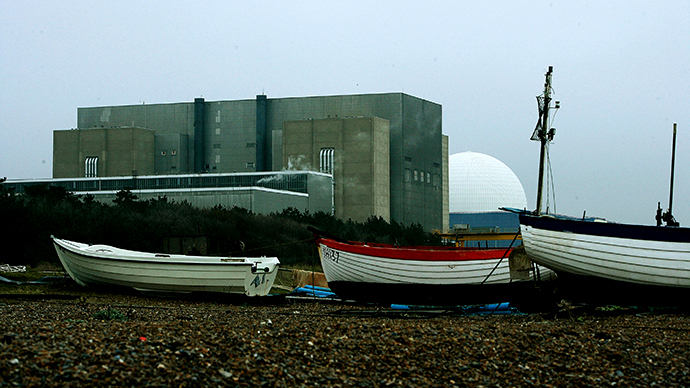Beast of burden: UK taxpayer to bear costs of nuclear leaks, not private firms

The private consortium that will manage the decommissioning of the UK's decaying Magnox nuclear reactors won’t be made to bear financial responsibility in the event of a radioactive incident. Taxpayers will have to pick up the tab instead.
Private contractors will be indemnified by the government, despite concerns that exempting them from financial liability for nuclear incidents could prove a disaster for the taxpayer, the Guardian reports.
Earlier this month the Department for Energy and Climate Change (DECC) presented parliament with a departmental minute concerning an indemnity to be given by the Nuclear Decommissioning Authority (NDA) in relation to the proposed Magnox reactors, built five decades ago. Among the reactors are some of the oldest facilities at Sizewell, Hinkley and Dungeness, which have been supplying electricity to the national grid for 40 years.
The Berkeley site in Gloucestershire, which entered service in 1962, was the first commercial nuclear power station in the UK to be decommissioned. After 27 years of operation, generating enough electricity on a typical day to serve an urban area the size of Bristol, the twin reactor station shut down in 1989. The station is currently undergoing work to decommission the site.
Meanwhile, according to the departmental minute, the prospective Parent Body Organizations (PBOs), selected through a competitive process, "are not prepared to accept liability" for certain nuclear liability claims. It adds that "because of the nature of nuclear activities the maximum figure for the potential liability is impossible to accurately quantify." But there is allegedly only a "low probability" of a claim against the public purse.
Among the fierce critics of the use of the indemnity is Labour MP Paul Flynn, who says the nuclear debate in Parliament has been passed over by the government.
"There have been major nuclear accidents about every decade since Three Mile Island," Flynn told the Guardian.
"More are very likely from technical failure, terrorism, human error or natural disaster. If risk is minimal, nuclear sites could be insured commercially."
"The cost of the Fukushima cleanup and damages ranges from $250bn [£150bn] to $500bn and rising," the politician noted.
"Nuclear installations are uninsurable in normal commercial terms. Only gullible governments can bear the enormous risk. If operators paid for their own insurance indemnities, their case for economic production of nuclear electricity collapses," he added.
However, Energy Minister Michael Fallon, in his written statement to parliament, entitled "Contingent liability: indemnification by the nuclear decommissioning authority," argues that there was "a very strong case" for the indemnity.
"An indemnity is a prerequisite to awarding the contract and securing the benefits of the competition. There is only a very low probability of a claim being brought under the indemnity and our assessment is that the benefits of the NDA contracting with a new PBO outweigh the small risk that the indemnity may be called upon," the minister asserted earlier in February.














